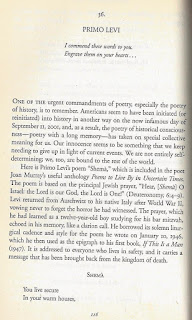Primo Levi
PRIMO LEVI
I commend these words to you.
Engrave them on your hearts...
ONE OF THE
urgent commandments of poetry, especially the poetry of history, is to
remember. Americans seem to have been initiated (or re initiated) into history
in another way on the now infamous day of September 11, 2001, and, as a result,
the poetry of historical consciousness-poetry with a long memory-has taken on
special collective meaning for us. Our innocence seems to be something that we
keep needing to give up in light of current events. We are not entirely self-determining;
we, too, are bound to the rest of the world.
Here is
Primo Levi's poem "Shemà" which is included in the poet Joan
Murray's useful anthology Poems to Live
By in Uncertain Times. The poem is based on the principal Jewish prayer,
"Hear, [Shemà] O Israel: the
Lord is our God, the Lord is One!" (Deuteronomy, 6:4-9).
Levi
returned from Auschwitz to his native Italy after World War II, vowing never to
forget the horror he had witnessed. The prayer, which he had learned as a
twelve-year-old boy studying for his bar mitzvah, echoed in his memory, like a
clarion call. He borrowed its solemn liturgical cadence and style for the poem
he wrote on January 10, 1946, which he then used as the epigraph to his first
book, If This Is a Man (1947). It is
addressed to everyone who lives in safety, and it carries a message that has
been brought back from the kingdom of death.
SHEMÀ
You live
secure
In your warm
houses,
Who return
at evening to find
Hot food and
friendly faces:
Consider whether this is a man,
Who labors in the mud
Who knows no peace
Who fights for a crust of bread
Who dies at a yes or a no.
Consider whether this is a woman,
Without hair or name
With no more strength to remember
Eyes empty and womb cold
As a frog in winter.
Consider
that this has been:
I commend
these words to you.
Engrave them
on your hearts
When you are
in your house, when you walk on your way,
When you go
to bed, when you rise.
Repeat them
to your children.
Or may your
house crumble,
Disease
render you powerless,
Your
offspring avert their faces from you.
(TRANSLATED BY RUTH FELDMAN AND BRIAN
SWANN)
In this
poem, Levi was especially drawing on verses six and seven of Deuteronomy:
And these
words, which I command thee this day, shall be in thine heart: And thou shalt
teach them diligently unto thy children, and thou shalt talk of them when thou
sittest in thine house, and when thou walkest by the way, and when thou liest down,
and when thou risest up.
"Whether we like it or not," Levi wrote to a
friend, "we are witnesses and we carry the weight of that fact." The
burden of memory is heavy, but also electrifying. "I had a torrent of
urgent things I had to tell the civilized world," he declared. "I
felt the tattooed number on my arm burning like a sore."
The prophetic fury behind the particular witnessing, the
remembering, at the end of Levi's poem is immense, The poet puts a terrible curse
upon anyone who forgets these people, this Adam and Eve, who - have been so
dehumanized that we are asked to consider "if this is a man" and
"if this is a woman." It is a lasting obligation to remember their
suffering. It is a human injunction, a ritual commandment. We must do
everything in our powers, Levi suggests, to keep them from becoming anonymous
victims; 'Ye must engrave their images on our hearts and pass on their memories
to our children.
Edward Hirsch: Poet's Choice


Comments
Post a Comment